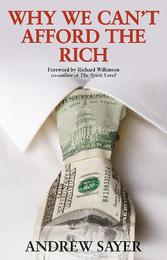
|
Why We Can't Afford the Rich
Hardback
Main Details
| Title |
Why We Can't Afford the Rich
|
| Authors and Contributors |
By (author) Andrew Sayer
|
| Physical Properties |
| Format:Hardback | | Pages:448 | | Dimensions(mm): Height 216,Width 148 |
|
| Category/Genre | Political economy |
|---|
| ISBN/Barcode |
9781447320791
|
| Classifications | Dewey:339.2 |
|---|
| Audience | | Professional & Vocational | |
|---|
|
Publishing Details |
| Publisher |
Policy Press
|
| Imprint |
Policy Press
|
| Publication Date |
25 November 2014 |
| Publication Country |
United Kingdom
|
Description
As inequalities widen and the effects of austerity deepen, in many countries the wealth of the rich has soared. Why we can't afford the rich exposes the unjust and dysfunctional mechanisms that allow the top 1% to siphon off wealth produced by others, through the control of property and money. Leading social scientist Andrew Sayer shows how the rich worldwide have increased their ability to create indebtedness and expand their political influence. Winner of the 2015 British Academy Peter Townsend Prize, this important book bursts the myth of the rich as specially talented wealth creators. It shows how the rich are threatening the planet by banking on unsustainable growth. The paperback includes a new Afterword updating developments in the last year and forcefully argues that the crises of economy and climate can only be resolved by radical change to make economies sustainable, fair and conducive to well-being for all.
Author Biography
Andrew Sayer is Professor of Social Theory and Political Economy at Lancaster University, UK. He has a long-standing interest in moral economy and has written several books on political economy, inequality, class, and philosophy and ethics, including Radical Political Economy: A Critique (Blackwell, 1995); The Moral Significance of Class (2005) and Why Things Matter to People: Social Science, Values and Ethical Life (2011) (both Cambridge University Press).
Reviews"A refreshing antidote to a public discourse that has allowed the perpetrators of the financial crisis to make massive gains, while the full burden of costs falls on those innocent of its causes. A must-read for all those who want to reverse that injustice and a wake-up call for the rich." Ann Pettifor, Director, Prime: Policy research in macroeconomics. "Cuts through the hype so often used to defend growing inequality and gets to the core of the problem, with suggestions about where solutions may come from." Danny Dorling, University of Oxford. "Engagingly explains how - and why - we have such trouble seeing what the rich are doing. We are the job creators, they insist. But our rich aren't creating jobs. They're not creating wealth. They're extracting wealth from the rest of us." Sam Pizzigati, Institute for Policy Studies, Washington, D.C., and editor, Too Much. "Unmatched in persuasive argument and compelling illustrations, Andrew Sayer shows how the rich and the super-rich are destroying not just the economy but the planet too. Everyone should read Why we can't afford the rich and spread the word." Michael Burawoy, University of California, Berkeley. "This timely and important book exposes the pernicious influence of the super rich on our economic and social fabric. It underlines the need for radical action to redistribute wealth, rebalance our economy and tackle inequality. A must read for politicians and policymakers alike" Frances O'Grady, TUC General Secretary. "Packed with useful information and insights, this is a useful complement to Thomas Pikkety's Capital in the Twenty First Century, and makes a serious challenge to the many claims propagated by rich people and their minions." Tax Justice Network "Sayer puts forth a cogent and thoroughly convincing argument that will enlighten and inform-and may even help instigate the radical changes he puts forth." Publishers Weekly "Adds to the growing body of work that challenges mainstream economic thinking and traditional self-justifications for inequality." New Left Project "Sayer does an impressive job of bringing home to the reader the scale of the threat capitalism now poses to humanity. As an introduction to critical political economy, the book is one of the best available." Counterfire
|